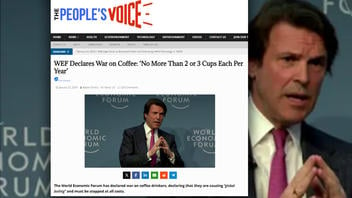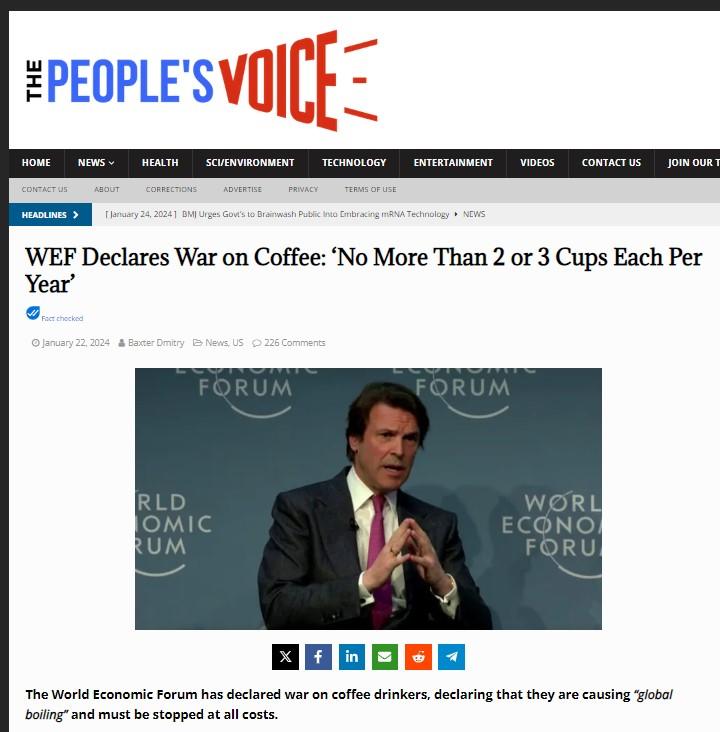
Did the World Economic Forum declare that coffee drinkers will have to limit themselves to two or three cups of coffee per year in the future? No, that's not true: No recommendation to limit coffee consumption was made at the Forum's annual meeting in Davos, Switzerland. At a session titled "Putting a Price On Nature," guest panelist Hubert Keller mentioned the average amount of CO₂ emissions, in tons, that are produced per ton of coffee consumed. He did not follow this with recommendations to limit coffee consumption, but to simply be aware of this. He followed with suggestions to transform monoculture coffee plantations to a more lucrative agroforestry model, which he said are regenerative and also sequester carbon.
The claim appeared in an article (archived here) published by The People's Voice on January 22, 2024, titled "WEF Declares War on Coffee: 'No More Than 2 or 3 Cups Each Per Year.'" It began:
The World Economic Forum has declared war on coffee drinkers, declaring that they are causing 'global boiling' and must be stopped at all costs.
According to World Economic Forum Agenda Contributor Hubert Keller, "The coffee that we all drink emits between 15 and 20 tonnes of CO2 per tonne of coffee... Every time we drink coffee, we are putting CO2 into the atmosphere."
(Source: thepeoplesvoice.tv screenshot taken on Wed Jan 24 21:40:36 2024 UTC)
A January 22, 2024, X post from Wide Awake Media is embedded in The People's Voice article. This post, when fully expanded, includes a direct link to the 48:32-minute-long video of the January 17, 2024, World Economic Forum (WEF) session. At the 24:28 mark, the host invites Hubert Keller, the senior managing partner at Bank Lombard Odier & Co. Ltd., to share his ideas on coffee. Keller says:
Coffee is really interesting because you have the nature dimension of coffee and then you have the economics of coffee, the value chain side of coffee. On the nature side, basically the coffee that we all drink, emits between 15 to 20 tons of CO₂ per ton of coffee -- so we should all know that. This is, every time we drink coffee we are basically putting CO₂ into the atmosphere. The other reason, and one other reason, most of the coffee plantation, most of the coffee is produced from monoculture and monoculture is also affected by climate change. The quality of these nature assets is deteriorating quite rapidly.
The CO₂ statistic cited is by Keller is in line with current research. An analysis article by environmental scientists at the University College of London published in theconversation.com on January 4, 2021, cites roughly the same 15:1 CO₂ to coffee ratio, but also add details about how that carbon cost could be reduced to 3.51:1 using green methods:
Growing a single kilogram of Arabica coffee in either country and exporting it to the UK produces greenhouse gas emissions equivalent to 15.33 kg of carbon dioxide on average. That's raw, pre-roasted beans (otherwise known as 'green coffee') produced using conventional methods. But by using less fertiliser, managing water and energy use more efficiently during milling and exporting the beans by cargo ship rather than aeroplane, that figure falls to 3.51 kg of CO₂ equivalent per kg of coffee.
The People's Voice claims the WEF said people must dramatically limit their coffee consumption -- but Keller and other WEF forum participants did not suggest that. At the 26:38 mark in the video, Keller concludes his message with his ideas for how coffee production could be done better, finishing with a reassuring word to coffee drinkers:
The opportunity is to basically bring capital for return in this value chain, to basically, you know, acquire or lease these coffee assets, these monoculture coffee assets, to transform them to a regenerative agroforestry model. In doing so we would create effectively a climate and a nature premium which will have a lot of value for these parts of the value chain that can inset these climate and the nature premium and you end up with basically coffee plantations that are fully regenerative, that are sequestering carbon, that are positive for nature, that are restoring biodiversity, and that basically are creating better value for an asset that has a longer life without actually the consumer paying any more for its daily coffee.
Lead Stories used Google to search the WEF website for "coffee AND '2 or 3 cups per year'" (archived here). We found no articles stating that people should limit their coffee to two or three cups per year.
The People's Voice
The People's Voice has a lengthy record of publishing false stories in the past. It describes itself as a resource "comprised of various web pages operated by Fact Checked Limited," but it has nothing to do with fact-checking.
As of this writing, its website contained a liability disclaimer, saying:
FACT CHECKED LIMITED AND/OR ITS SUPPLIERS MAKE NO REPRESENTATIONS ABOUT THE SUITABILITY, RELIABILITY, AVAILABILITY, TIMELINESS, AND ACCURACY OF THE INFORMATION, SOFTWARE, PRODUCTS, SERVICES AND RELATED GRAPHICS CONTAINED ON THE SITE FOR ANY PURPOSE. TO THE MAXIMUM EXTENT PERMITTED BY APPLICABLE LAW, ALL SUCH INFORMATION, SOFTWARE, PRODUCTS, SERVICES AND RELATED GRAPHICS ARE PROVIDED 'AS IS' WITHOUT WARRANTY OR CONDITION OF ANY KIND.


















